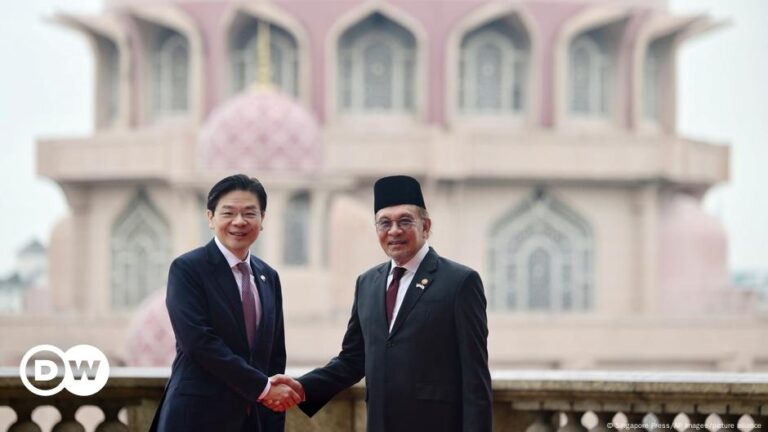Last week, Malaysia and Singapore signed an agreement to establish the Johor-Singapore Special Economic Zone (JS-SEZ) in Malaysia’s southernmost state of Johor, just north of Singapore.
The initiative aims to leverage the strengths of both countries to deepen economic ties, while attracting global investment and facilitating the cross-border flow of goods and people between the two countries.
Johor is Malaysia’s second most populous state and plays an important role in the country’s economy, with key sectors such as manufacturing and tourism.
Proposals for JS-SEZ include a passport-free immigration system, cooperation on renewable energy, and simplified business licensing.
Singapore and Malaysian leaders praise project
Singapore Prime Minister Lawrence Wong said the JS-SEZ would create good jobs for the people of both countries and attract significant international investment.
He said: “Both countries are actively engaging with stakeholders to ensure that JS-SEZ has the conditions for our businesses to grow together in the long term. “Both sides should work together to attract new investment projects.”
Malaysian Prime Minister Anwar Ibrahim said the project created a “unique initiative” for both countries to leverage each other’s strengths and deepen cooperation in an increasingly polarized world.
The two leaders also called for proposals for high-speed rail connectivity between the two countries, but Anwar said government involvement should be limited and the private sector should take the lead. The previous plan was scrapped in 2021 due to disagreements.
Johor Chief Minister Ong Hafiz Ghazi stressed the importance of seizing the opportunities presented by the new agreement. He stressed that the benefits of the JS SEZ will extend beyond the state capital Johor Bahru to the entire state, contributing to Malaysia’s broader economic and tourism sector.
“The key question is whether we, the people of Johor, are ready to embrace the opportunity to transform our economy, because if we are not ready, others will take advantage. ” he told DW. “Malaysia as a whole will benefit from various sectors such as economy, tourism, etc.”
Attractive tourist destination Johor
Johor has long been home to several important tourist attractions such as Legoland, Desaru and Johor Zoo.
In 2023, more than 16 million foreign tourists visited Johor. Government officials predict the overall goal for 2024 is 20 million.
Muhamed Abdul Khalid, a researcher at the Malaysian Institute of International Studies at the National University of Malaysia, said that the JS-SEZ is the country’s first economic zone and is based on “Iskandar Malaysia,” a major economic corridor in Johor state that was launched in 2006. He said he is doing so. .
“The JS SEZ is quite large, surrounding Iskandar and incorporating the failed and stalled Forest City project,” he told DW.
Forest City’s Chinese developers envisioned it as home to 700,000 people, but less than a quarter of it was completed and it has been called a ghost town.
What role can China play?
Mr Ian Chong, a political scientist from Singapore, said the JS-SEZ would leverage the strengths of both countries and foster closer ties and mutual benefits.
“It brings the two countries closer together,” he told DW. “If things go well, both Malaysia and Singapore will benefit.”
Chong emphasized the need for a diversified long-term foreign direct investment (FDI) strategy, noting that while China can contribute, its role may be constrained by domestic economic challenges.
“In the long run, we should see diversification of investment, especially from developed countries. Developed countries have been and will continue to be the largest source of FDI in ASEAN in general. China could become a source of FDI. However, given domestic economic headwinds and debt, China could be a source of FDI.FDI resources may be more limited, he said.
“In the short term, FDI into Southeast Asia, including Malaysia, has benefited from the ‘China plus one’ strategy of many companies,” he added, as companies relocate parts of their supply chains. He mentioned global plans to diversify supply chains by Chinese production is being directed to other promising emerging markets. ”
“However, these benefits come from major powers being more tolerant of small and medium-sized countries cooperating with their rivals. may face some restrictions,” Chong said.
Potential political backlash
Mr Khalid warned that the JS-SEZ would pose political challenges, particularly regarding Singapore’s influence on Johor and the cross-border labor movement.
“The government must ensure that there is no risk of ‘gentrification’ in Johor. Failure to do so could lead to a political backlash,” he said.
Mr Khalid suggested that the Malaysian government should also consider the wider impact of the JS SEZ.
“Concentrating economic activity and offering highly favorable tax breaks within special zones could divert investment away from other regions and exacerbate regional inequalities,” he said.
“If the government fails to effectively address these concerns and ensure that the benefits of SEZs are shared equitably across the country, there could be a perception of economic colonization by Singapore.”
Editor: Keith Walker


